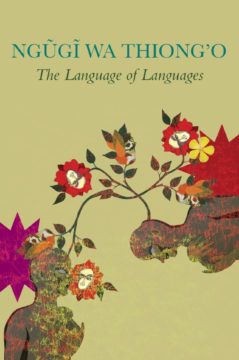 Remo Verdickt and Emiel Roothooft in LA Review of Books:
Remo Verdickt and Emiel Roothooft in LA Review of Books:
NGŨGĨ WA THIONG’O is considered one of the leading writers on the African continent of the last 50 years. On December 31, 1977, he was arrested and spent a year in prison as an opponent of the Kenyatta dictatorship. During his imprisonment, Ngũgĩ developed the seminal Decolonising the Mind: The Politics of Language in African Literature (1986) and decided to substitute his native Gĩkũyũ for English as his primary language of writing. A staunch champion of (self-)translation, he recently published a collection of essays on the subject, entitled The Language of Languages (2023). Here is an edited version of our conversation about his new book and how it reflects back upon his career.
REMO VERDICKT & EMIEL ROOTHOOFT: Why is translation “the language of languages”?
NGŨGĨ WA THIONG’O: When two or three languages share a knowledge system, they do this through translation. In other words, if languages had a common language, that language would be called translation. Hence my new book’s title, The Language of Languages.
I reject a hierarchy of languages where some languages assume themselves to be higher than others—especially within postcolonial countries or countries that experience any system of oppression whatsoever. At the same time, I believe that all languages are very unique. Each language, however small, has a unique musicality that cannot be replaced by another. I like to compare them to musical instruments. A piano has its own specific sound or musicality, which you cannot mistake for that of a guitar. You cannot destroy or diminish the importance of other instruments like the guitar or the violin and leave only the sound of the piano. When different instruments work together, they produce harmony, orchestras—just like languages.
More here.
